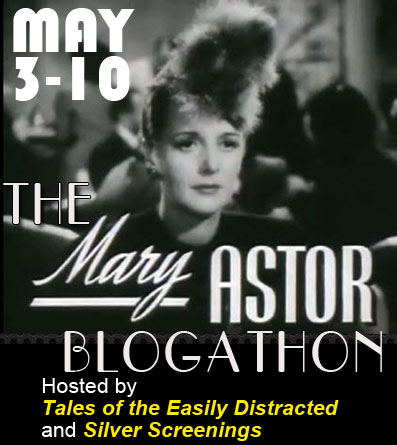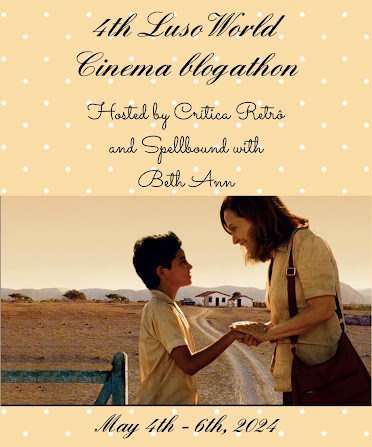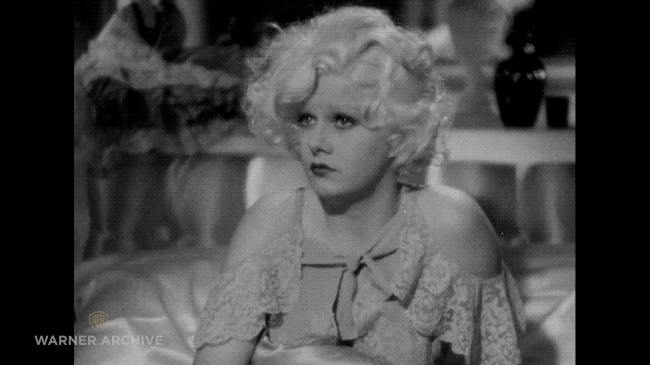This post is part of the Mary Astor Blogathon, co-hosted by yours truly and the lovely & talented Tales of the Easily Distracted. It runs May 3-10, 2013.

Mary Astor (right) is sick of Bette Davis’ cheerful smothering.
Don’t you love a clever and witty antagonist?
In a pivotal scene of the 1941 drama The Great Lie, the antagonist, Mary Astor, is handed a cocktail. She responds brightly, “Oh, I shouldn’t. But how I love to do things I shouldn’t.”
Her demeanor is light, but her words are heavy. She’s directing her comments to her on-screen rival, Bette Davis, who sits across from Astor in this scene, worried that Astor is going to publicly reveal a secret.
The Great Lie offers us a refreshing casting switch. Davis is the self-sacrificing protagonist, while Astor, in her Oscar-winning role, is the unpredictable antagonist. (We’d love to call Astor a villain, the way she sports her glitzy I’m-An-Important-Musician cape.) She relishes the thought of taking everything Davis cares about, then squishing Davis with designer heels.
The Great Lie is a melodrama about two smart and capable women who vie for the affections of the unremarkable George Brent. Brent spurns Astor in favour of Davis, but Astor holds the mother of all trump cards: she’s pregnant with Brent’s child.
No sooner does she reveal this juicy morsel to Davis than Brent disappears while travelling on official government business to South America. Believing Brent to be dead, a grieving Davis convinces Astor to let her raise his child. This would allow Astor to remain unencumbered so she can concentrate on her career as a concert pianist.
It was Davis who insisted Astor play the part of the callous, self-absorbed musician. Astor, who was a pianist in her own right, was the perfect choice for this role. When she plays Tchaikovsky’s Piano Concerto No. 1, she attacks the piano keys as though she’s beating them into musical submission.
(Digression: Composer Max Steiner had fun with this concerto, weaving elements of the piece into the film’s soundtrack.)
Astor is fascinating as the temperamental artist who can be charming with those she likes or wants to use. She is the very definition of a spoiled, indulged celebrity. In one scene she sniffs, “Take this tray away. I hate the smell of food.”
Part of the movie takes place in the Middle-of-Nowhere, Arizona. To preserve the reputation of Astor’s character (she is a single woman in the 1940s, after all), Davis whisks her away to Arizona to await the arrival of the baby. Davis is over-the-moon excited; Astor becomes increasingly bad-tempered. She’s on a dreadful diet, she can’t drink, she has no diversions. Control-freak Davis is even keeping track of the number of cigarettes smoked per day. We, as viewers, start to feel a little sympathetic towards Astor. Those conditions would drive anyone crazy.
Our favorite scene is the one where Davis visits Astor and pitches the idea to raise Astor’s child herself. Astor’s face is an exquisite study in acting: you can see her disbelief, then skepticism, and finally her reluctant agreement. Astor says very little in this scene – Davis does most of the talking – but you can feel what Astor’s thinking. Davis’ plan is ridiculous and improbable, even for 1941, but because Astor believes in it, we believe in it.
The Great Lie may not have a storyline that appeals to everyone. (For Pete’s sake – they’re fighting over George Brent??) However, we encourage you to see an exceptional actress in her well-deserved Oscar-winning performance.
The Great Lie: starring Bette Davis, George Brent, Mary Astor. Directed by Edmund Goulding. Written by Lenore Coffee. Warner Brothers, 1941, B&W, 110 mins.












Thanks for a fun look at a favorite. Watching Astor and Davis play off each other is a real treat. Even if it’s all over George Brent.
LikeLike
Ha ha! It’s too bad Astor & Davis didn’t do more movies together, isn’t it?
LikeLike
I do have to admit George Brent is also someone who threatens to sink the movie for me. I also don’t think it was that much of a stretch for Davis to play a “self-sacrificing protagonist”, as she did it brilliantly in “Now, Voyager”. Nevertheless, I enjoyed Astor and Davis in this, and it showed while they’re both capable of playing the big emotions, they could also be more subtle as well (certainly, Davis didn’t get enough credit for that). Very nice write-up.
LikeLike
You’re right, Sean. Davis was sympathetic in “Now, Voyager” as well as “Old Acquaintance” and “The Man Who Came to Dinner”, among others. However, I was surprised that she would take the sympathetic role when there was the juicy Astor role to be had. It’s to her credit that she fought for Astor.
LikeLike
I am so in agreement with you – George Brent? Really. I wonder that he is even capable of…well, you know. Ha! I never got his strange allure and I’m glad to know I’m not the only one. Oh well, it could have been Kent Smith or George Marshall. (About whom I ‘famously’ posted one might support the theory that all three are really the same man.) Talk about dullsville. Though Marshall, at least, did, once in a while, have a twinkle in his eye.
I’ve never seen THE GREAT LIE, but you make it sound like a movie I might enjoy for Mary Astor’s Oscar winning performance. So many movies, so little time – know what I mean?
Thanks for a wonderful post and thanks for co-chairing the Blogathon. It’s been lots of fun.
LikeLike
LOL re: George Brent and Kent Smith!!! (I’m not as familiar with George Marshall, but your theory seems sound to me.) In fact, during the movie I was actually wondering, “How would Kent Smith do in this role?”
Could you send me the link to your post? Would love to read it. Also, it might make for a fun, tongue-in-cheek blogathon: different actors that you suspect are actually the same person.
LikeLike
Make that blogathon happen!!!!!!!!!!!!!!!!!!! There are so many including but not limited to Shania Twain and Fran Drescher! (Also, when you get that link, I’d like to read it, too.)
LikeLike
Wouldn’t that be fun? Maybe we should think about this…?
LikeLike
Thanks for the great review, as usual. Mary Astor, Bette Davis and Tchaikovsky all in one movie? Sounds like a winner to me!
LikeLike
Ha ha! Yes, it’s a winning combination.
LikeLike
It has been absolutely ages since I watched “The Great Lie”. What I do remember most is Astor attacking the keyboard, as you say. I guess I’m overdue for spending time with those two ladies.
LikeLike
Astor does seem to take out her aggression on the piano but, then again, it is is a rather aggressive piece.
Davis and Astor are so much fun to watch, aren’t they? They are evenly matched when it comes to talent.
LikeLike
I can’t wait to see this film. Davis is my all time favorite and just knowing that she hand picked Astor to work opposite her in this film as the sympathetic antagonist just makes me chomp at the bit to sit right down and start watching it right away. I love both these women and wish they had done more films together. I love your enlightening post. I had no idea Astor was a pianist as well. Just another reason to adore her even more. Great entry for the blogathon festivities. And I agree, fighting over George Brent? Oh well, that was Hollywood. I can’t wait to see Astor ‘attack’ the keyboard. What fun. Thanks so much Ruth for shining light on this film for all of us!- Cheers Joey
LikeLike
Thanks, Joey. I’ll be interested in reading your review if you see this movie. And yes – Astor really lets that piano have it!
LikeLike
Ruth, I’ve been looking forward to your post about THE GREAT LIE like a kid looks forward to Christmas, and you filled my expectations with your witty, stylish prose, and then some! Generally, I HATE weepies like this, but Mary Astor and Bette Davis are always worth watching!
I love your comments about “the unremarkable George Brent!” I can see from our friends and fellow bloggers’ comments that I’m not the only one who’s “meh” at best about Brent. How did he become a movie star, anyway? Was it because of wartime, and all the popular male stars were in battle?
Our gal Mary is always excellent in all her roles, but she definitely earned her Oscar here! She commands the screen without chomping the scenery as selfish, sophisticated pianist Sandra Novak! It’s fun to watch these characters onscreen during their Arizona Purgatory. In a deliciously wicked way, it’s fun to watch Bette’s saintly Maggie, almost passive-aggressive, vs.selfish party-girl pianist Sandra!
There were rumors that Mary was “stealing the picture” from Bette Davis, but both Mary and Bette denied it; as Bette said, “Mary handed THE GREAT LIE to me on a silver platter.” Indeed, when Mary won her Oscar, she thanked two people: Bette Davis, and Tchaikovsky, BRAVA on a fabulous post to salute Mary, Ruth; you’re the awesome!
**SPOILER ALERT!** I love that last scene where Sandra spills the bean and wants to keep Baby Pete for herself. The stunned look on Sandra’s face when Pete holds Maggie close and says,”We;ll miss the little chap, but at least you and I will still have each other.” There’s Sandra, thinking she’s won Pete and the baby, but SURPRISE! As Maggie, Pete, and Baby Pete become a family before the audience’s eyes, Sandra’s practically leaving in a huff! Don’t you love it when nice gals finish first, even if it means our Mary has only her fame, fortune, and men to cuddle up to? 😀
LikeLike
Ruth, Have not seen this but it is one that I have to keep an eye out for. Brent is a bit of a dullard but Davis and Astor would make up for it. Enjoyed your take on this!
LikeLike
Ha ha! Thanks, John. I guess George Brent is a good choice in some ways because he doesn’t overshadow Astor and Davis. But you’re right – those two ladies have personality to spare!
LikeLike
Ooh! I had forgotten about that scene! Yes, that one’s so good! And I’m totally in agreement about George Brent. Dude is a Baked Lays chip. Good in its bland way, but bland nonetheless.
LikeLike
I have always enjoyed George Brent especially in Tomorrow Is Forever and The Fighting 69th.
LikeLike
Now, The Fighting 69th is one I haven’t seen. Thanks for recommending it. 🙂
LikeLike
Great review, Ruth! I’m another one who loves this film – Bette Davis and Mary Astor make a wonderful combination and, as you say, it’s unexpected to have Astor in the diva role and Davis as the sweet, self-sacrificing rival. Although, having said that, Davis is pretty domineering in the whole section where the two women are hidden away together, a ‘control freak’, as you say! I do agree with you and Sean that Davis played many self-sacrificing roles – some others that come to mind are ‘All This and Heaven Too’, ‘The Sisters’ and ‘The Old Maid’… but the ‘bad girls’ are the roles of hers that tend to be remembered best.
Must say I rather like George Brent – he is very funny in ‘The Purchase Price’ with Barbara Stanwyck. Anyway, I did enjoy your posting a lot and thanks so much to you and Dorian for organising this blogathon.
LikeLike
Ha ha – yes, Davis IS rather domineering in the Arizona scenes, isn’t she? It was only a matter of time before Mary Astor went crazy.
I haven’t seen George Brent in the purchase price but I bet he’s a good foil for Barbara Stanwyck.
The blogathon was Dorian’s idea, and she’s the one who made all the banners. Thanks for your comments! 🙂
LikeLike
Judy, Ruth, thanks and you’re welcome! 😀
LikeLike
“The Great Lie”, may not have been a very believable, love triangle, but the performances were all very good.
LikeLike
“Not believable” is putting is mildly! I agree – Astor and Davis alone are worth the price of admission.
LikeLike
I love this movie for precisely the reasons you have pointed out here. (And I couldn’t agree more about the lack of believability in fighting over George.) Astor and Davis really know how to make every scene count and together they are perfectly matched. So often in her career, Davis seems to overshadow her,somewhat less than worthy co-stars,but when she considers her co-stars to be her equal, (as is obviously the case here),that’s when movie magic happens. Thanks for reminding me about a film that I need to revisit soon.
LikeLike
True, Davis had a way of overshadowing some co-stars, but not Astor, thankfully. They really do make movie magic, don’t they? Well put.
LikeLike
I haven’t seen nearly enough Mary Astor movies, but The Great Lie is one that I have seen. What a great little melodrama it is. Even though I watched it because Davis is in it, the scene that sticks out in my memory most is of Astor pounding on the piano keys; I love your description of her “beating them into musical submission” – very apt, to say the least!
LikeLike
Ha ha – yes, she really lets that keyboard have it!
Thanks for dropping by. 🙂
LikeLike
What a great post, Ruth…even if I’m not 100% with you about George Brent. No, he’s not as manly as some of my other great loves, but I think he’s always dashing, distinguished, and classy. This is one of my 5 faves of his films…in my top 10 of Bette.
While Bette is so good when she’s being bad, it’s always a nice change of pace to see her playing a likable character.
I agree about Mary’s performance and Oscar win for her work in “The Great Lie.” She was completely brilliant. This has been a terrific blogathon, and I think Mary would be thrilled to know of the outpouring of love and appreciation for her.
Thanks for hosting.
LikeLike
I have to agree about George Brent being a class act – he was no hoodlum, that’s for sure.
It has been a great blogathon, hasn’t it? Dorian at Tales of the Easily Distracted hit upon a good thing. All the posts have been interesting and so well done.
LikeLike
Aw, thanks for your kind words, Ruth! I’ve been loving every minute of our Mary Astor Blogathon,, and beaucoup thanks to you and all of our wonderful bloggers for making our Blogathon such a joy to work on and read! 😀 I say we’re all sugar bowls with two handles (major compliment here at Team Bartilucci HQ) for our efforts!
LikeLike
George Brent is kind of taking over this comment thread, isn’t he? I sort of imagine Brent took one look at the script for his character (the guy dumps Astor when she refuses to reschedule her very important concert just so they can get married on the day he wants–yeah) and said, “Ah hell, let Mary and Bette have the movie.”
I do love all the backstage rewriting by Astor and Davis, which probably saved the movie from being unwatchable trash. It’s really fun to think of Davis, one of the biggest scene stealers in Hollywood, letting Astor run away with the movie because she knew it would make it better.
LikeLike
Ha ha! You’re probably right re: George Brent saying “Let Mary and Bette and Mary have the movie.” That would be a wise thing to say.
Yes, it would be interesting to compare the original script with the final one, to see how Astor & Davis changed it.
LikeLike
I’ve not seen this film but, after this review, I’ll be heading to NetFlix pretty soon. Can’t wait to see Astor and Davis in scenes together and it’s because of this well-written post. Thank you so much!
LikeLike
Oh yes, I hope you get a chance to see it. Mary Astor is FAB in this role. She really deserved her Oscar.
LikeLike
I love “The Great Lie” and must confess that I also love George Brent. (He was probably my first movie star crush.) This is without a doubt Mary’s film. Bette Davis rarely was outshone by a female co-star, but she’s no match for Astor in this one. Bette had great respect for Mary Astor and her talent which why she wanted the Sandra character to get good dialogue and scenes.
LikeLike
Well, that just means you like gentlemen with class, and there’s nothing wrong with that. 🙂
For all Davis’ faults, she really knew filmmaking and had an eye for talent.
Thanks for dropping by!
LikeLike
I really enjoyed your review of ‘The Great Lie’ and would love to see it. Astor and Davis sounds like a great combination and I don’t mind Brent either.
LikeLike
I hope you get the chance to see this movie. Astor and Davis are really terrific in their scenes together.
Thanks for dropping by!
LikeLike
This story may be unbelievable but it sounds like it’s right up my alley! Just love that melodrama and Davis to boot, no matter what role she plays! And it sounds like something I’ve never seen Astor play. Cannot wait to see this – fun review.
Must admit I’m just starting to read all the entries to the blogathon and will be saying “I haven’t seen that a lot.” Of all the films Astor did I’ve seen a handful. With The Maltese Falcon and Meet Me in St. Louis as the only two I can say I’ve watched a zillion times. Gotta get my movie watching in high gear!
AGreat event!
Aurora
LikeLike
I can’t wait to read your thoughts on this film, Aurora. Astor and Davis are terrific, the score is fabulous, and the directing is top-notch.
There are a lot of Mary Astor films I haven’t seen either. I have a lot of catching up to do, too!
LikeLike
This really is Mary’s finest hour. She really proves what a great artist she was. I wanted to review this film so badly for the blogathon, but since you were doing all of the heavy lifting, I respectfully stepped aside – and I’m glad I did – great post!
LikeLike
Oh – I’m sad to hear that you wanted to review this movie, too. Thanks for your kind comments.
This film really is Mary’s finest hour, as you said. She owns every scene she’s in.
LikeLike
Great review of a much loved movie. I like George Brent and think he held his own with these two dynamic ladies. He was also very good in support of Bette in Dark Victory.
i liked Mary more than Bette in The Great Lie – Mary had the more vibrant role.
LikeLike
You make a good point about George Brent – he is no shrinking violet.
Isn’t Mary terrific here? You can watch this film repeatedly and never tire of her performance.
LikeLike
Speaking of clever and witty, I love your line: “She relishes the thought of taking everything Davis cares about, then squishing Davis with designer heels.” For me, this is the penultimate Mary Astor film for all the reasons you named (though I agree that be jealous over George Brent is unbelievable!). Astor and Bette Davis play off each other wonderfully.
LikeLike
Ha – thanks, Rick! I agree with you – this is the penultimate Mary Astor film. It’s too bad she & Davis didn’t do more films together.
LikeLike
Thanks for hosting this wonderful blogathon!
The great lie is a film I haven’t seen, and I must confess that I’m not much versed in Bette Davis’ career (the shame). I’ll certainly watch it in the future and, when I do it, I’ll remember you in the cocktail scene.
Kisses!
LikeLike
Ha ha! Thanks, Le. Yes, that cocktail scene is a good one. I hope you’ll write one of your wonderful reviews if you do get the chance to see “The Great Lie”.
LikeLike
Good write-up! I love this movie, and I love when anyone talks about it. Oh man, Mary Astor is so glamorous and devastating in this, and I love when she takes out her aggression by playing melodramatic piano pieces.
LikeLike
She does take out her aggression on those poor piano keys, doesn’t she. And “Glamorous & Devastating” is a perfect description for Mary Astor in this film.
LikeLike
So glad Bette, felt Astor was better for the part. She was great! (Also glad she got to show off those years of piano lessons that she hated so much.)
It’s not easy to steal the spotlight from our tenacious Bette, but Astor did for me. Both memorable performances and the script was a good one with great directing.
You’ve given us such a fun and well researched review, Ruth. I loved reading your take on this film.
Thanks for having me for this fun Blogathon on Mary.
Have a great weekend.
Page
LikeLike
Page, when I read the first part of your Mary bio, I chuckled when you mentioned the dreaded piano lessons.
No, stealing the scene from Ms. Davis was never an easy thing to do, but for Astor to do it repeatedly – and with Davis’ support – is truly remarkable.
Thanks for dropping by. I’m looking forward to reading more of your Mary bio. 🙂
LikeLike
This picture wouldn’t be much without Mary’s star turn and the Bette/Mary dynamic. Love Mary’s character, a truly obnoxious celebrity brat (to put it nicely). Great take on “The Great Lie.”
LikeLike
Ha ha – that is a nice way of putting it!
LikeLike
The stars make this film work, and work it does. Mary Astor is dynamic, and she always thanked Bette for supporting her through this film. Great review!
LikeLike
You’re right. This movie would be nothing without this cast. It would be so awful in the hands of less-skilled actors.
LikeLike
I saw this film for the first time a few weeks ago. Mary Astor was wonderful in this film, and dare I say it….at times she upstaged Bette Davis. (Gasp!)
LikeLike
Ha ha! And she handily upstaged Davis, didn’t she? I love Davis, but it was delightful to see Astor doing that.
LikeLike
While George Brent was a passable actor, I agree, they should’ve been fighting over Cary Grant, or Brian Aherne, or Joel McCrea!
LikeLike
Ooh – Joel McCrea might have been an interesting choice. I wouldn’t have thought of that.
LikeLike
How did I miss this post? It’s a winner, as always — I had to laugh out loud at your incredulity regarding the two women fighting over George Brent. I was also fascinated the first time I saw this by the fact that Astor was smoking and drinking while she was pregnant — they really lived it up back in the day! Good stuff, Ruth.
LikeLike
Oh right – the smoking and drinking! It’s a bit shocking to see, isn’t it? No wonder Bette Davis’ character had to monitor Mary Astor’s wild character.
Thanks for dropping by. 🙂
LikeLike
This sounds a delight. I’ll be honest, for a long time I only knew her for that quote about the 5 stages of Mary Astor.
LikeLiked by 1 person
Ha! Yes, that is a terrific quote about the 5 stages of Mary Astor. She was a terrific actress, and I really liked her (and Bette Davis) in this film.
LikeLiked by 1 person
Love Bette Davis too!
LikeLiked by 1 person
Isn’t she great? I love her in everything.
LikeLiked by 1 person